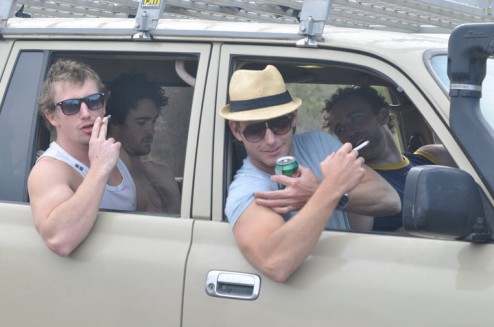 Can nice guys they finish first? Or is it always the bad boys who win the game? While you probably thinking I’m referring to my choice in men, I ask this question in a more general evolutionary context – inspired by a BBC documentary by Richard Dawkins. While one might expect Dawkins to say nice guys finish last, given his book The Selfish Gene, this documentary tells another story…
Can nice guys they finish first? Or is it always the bad boys who win the game? While you probably thinking I’m referring to my choice in men, I ask this question in a more general evolutionary context – inspired by a BBC documentary by Richard Dawkins. While one might expect Dawkins to say nice guys finish last, given his book The Selfish Gene, this documentary tells another story…
Dawkins refers to Game Theory and the Prisoner’s Dilemma, exploring it in a human social experience, and in the natural world.
Game Theory ‘attempts to mathematically capture behavior in strategic situations, or games, in which an individual’s success in making choices depends on the choices of others. While initially developed to analyze competitions in which one individual does better at another’s expense (zero sum games), it has been expanded to treat a wide class of interactions.’
Consider the different options in a game of chess:
1. White wins, black loses
2. Black wins, white loses
3. Stalemate
Do you notice there is no option for Black AND White to win?
The Prisoner’s Dilemma is ‘a fundamental problem in game theory that demonstrates why two people might not cooperate even if it is in both their best interests to do so.’
| Prisoner B Stays Silent | Prisoner B Betrays | |
| Prisoner A Stays Silent | Each serves 6 months | Prisoner A: 10 yearsPrisoner B: goes free |
| Prisoner A Betrays | Prisoner A: goes freePrisoner B: 10 years | Each serves 5 years |
While if both prisoners stayed silent they would only serve 6 months, the most likely outcome is for both to betray and both serve 5 years. It seems that while we could collaborate, our selfish gene means we don’t – or won’t.
In the documentary Dawkins shows how in the seemingly harsh dog-eat-dog world of nature, it is not the strongest who survive – it’s about being the fittest, and often this involves cooperation.
He describes a process of “reciprocal altruism“, for example when animals and birds groom each other. Dawkins describes a species of birds who must cooperate to suck the parasites off each other. He describes “cheats” who allow “suckers” to suck off their parasites, but refuse to repay the favour. If the world consisted of only cheats and suckers, suckers would go extinct. However, if there are also “grudgers” who suck but when they meet a cheat, they learn from the past and don’t suck the parasites off the cheater in the future. In a world with grudgers, the suckers and cheaters would go extinct and the grudgers would survive.
Returning to the Prisoner’s Dilemma, the experiment explores the games with lesser stakes, a few pounds, played over and over again:
| Player B chooses A | Player B chooses B | |
| Player A chooses A | Both get $2 | Player A gets 0Player B gets $1 |
| Player A chooses B | Player A gets $1Player B gets nothing | Both get $.20 |
Over time a cooperative strategy can be reached. If Player A tries an A he may lose one game but it will signal to Player B an intention to cooperate. Player B might not respond at first, but if Player A repeats his intention, Player B might start to also play As. If both players act on this cooperative signal, both players will come out on top.
It becomes a game of “tit for tat” – where one only reciprocates if the other one does. Dawkins give the example of bats, who provide reciprocal blood sharing – but only to other bats who are tit for tat players.
If Prisoner’s Dilemma was to be applied to our ecological crisis, what would the options be?
Maybe something like this:
| You change | You don’t change | |
| I change | Habitable planet for future generations. | If I (and the majority) change, you get a free ride. |
| I don’t change | If you (and the majority) guys change, I get a free ride. | Global warming, pollution, soil degradation, water dries up… inhabitable planet & extinction. |
If we figure out how to change, I’m willing to give co-operation a shot. Are you?
Check out the full doco, it’s well worth a peak – even if just to check out Richard Dawkins who is actually kinda cute in his youth…
Source:
Wikipedia (I was lazy) and Google Video.
Picture:
My surfer friends on a road trip – sometimes the “bad boys” are “nice guys” too.
No Comments Yet